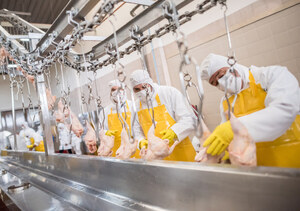 This time around, however, the enforcement of safety protocols will have the threat of further legal action behind it. On January 29, Foster Farms will appear in court again to show why the temporary court order should not be permanent while the underlying lawsuit winds its way through the court system.
This time around, however, the enforcement of safety protocols will have the threat of further legal action behind it. On January 29, Foster Farms will appear in court again to show why the temporary court order should not be permanent while the underlying lawsuit winds its way through the court system.TERMS OF THE TRO
The Temporary Restraining Order, which went into effect on December 28, requires Foster Farms to take 20 specific steps to protect workers. These include:
- Providing and requiring the use face masks and/or face shields;
- Providing dividers in break rooms and on the production line, where social distancing is not possible;
- Staggering employee schedules to reduce crowding;
- Installing handwashing and sanitizing stations throughout the workplace;
- Upgrading its cleaning protocols and scheduling cleaning on a continuous basis;
- Conducting health screenings, including temperature checks for all individuals entering the complex;
- Instituting public health return to work policies for those who have been sick; and
- Providing health and safety information training information in English, Spanish and Punjabi, the languages most frequently spoken at the facility.
Repeat offender – and everything you never wanted to know about chicken processing
The Livingston plant saw its second COVID-19 outbreak in early December when at least 48 employees tested positive. The plant had been shut down for six days in September after 392 workers tested positive and nine died. The conditions under which the plant was permitted to re-open after that closure are very similar to the requirements of the current TRO. In their Complaint, the UFW alleges that Foster Farms has been unwilling or unable to comply with federal and state guidelines. In “naked disregard” for workers’ health and safety, plant management:
- requires employees to work substantially less than six feet apart from each other for prolonged periods of time with no plastic divider or similar protection between them;
- fails to rigorously or effectively enforce social distancing or even to supply masks; and
- fails to keep its workforce adequately informed of safety and sick leave protocol, including access to COVID leave pay.
As the Complaint describes the corn dog line, “workers stand approximately two feet apart separated only by flimsy plastic curtains hung from overhead. Because the curtains are hung above the workers and therefore move around, the workers will often push them away in frustration because the plastic interferes with their speed. Some of the curtains are ripped and scratched. Moreover, the curtains are hung at or below eye level of the workers.”
Workers in Rotisserie section provide their own masks at their own cost and there is no consistency as to type; some are cloth, some are paper. Foremen in the live hanger area discourage workers from asking for replacement masks. There is frequent congestion around certain areas where workers congregate, including around the time clock and around bathrooms at breaks.
Emergency action
READ MORE CALIFORNIA LABOR LAW LEGAL NEWS
The evidence cited in the Complaint is anecdotal, but it is plentiful and concerns a deadly, contagious disease. The court found that the plaintiffs had “set forth sufficient evidence for the court to be concerned that perhaps Foster Farms is not complying, or is unable to comply, or unwilling to comply or turning a blind eye" to the mandates under which it, like many other businesses, must operate in a time of crisis.
